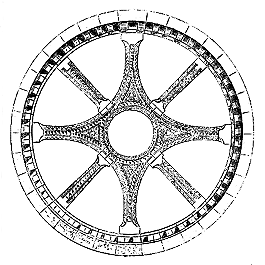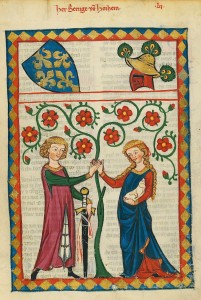Report of the session "Le Genre / Gender", Campus Condorcet, 10 avril 2015
Archive: February 13, 2018
The International Medieval Society workshop on Gender in Medieval Studies was held at the American University in Paris and moderated by Irene Fabry-Tehranchi (university of Reading) and Anna Russakoff (American University in Paris).
Professor Didier Lett, from Université Paris VII began the first talk: a captivating introduction to gender from a French perspective. He said that there is still a real shortage of French historians working on this topic, and that after a brief surge in interest in the years 2000, gender studies have again recently seen a slump. This is possibly because of tensions on the French political scene surrounding the legalisation of marriage and adoption for same-sex couples in 2013, opposed by conservative groups criticising what they call ‘la théorie du genre’.
Similarly, when discussing a core problem of how gender is viewed amongst French academics, he warned that many wrongly presume studies of gender to be the same as studies of the history of women. Lett stated that this misconception may be why there are negative connotations of those who study gender; he jokingly despaired of those who had heard his research interests and asked him, “Why? Are you a feminist?” This political link has to be rejected, he argued, because including analysis of gender is a vital tool for academics of the Middle Ages. He warned, however, that this tool through which we can consider and analyse aspects of medieval societies, should not be used in isolation but within its context, alongside other factors such as position and status in society. Lett gave the example that a female slave should not be considered on the same terms as a noblewoman, just on account of their gender.
Next to present was Professor Rosalind Brown-Grant from Leeds University. This was a perfect paper to follow on from Lett’s as Prof. Brown-Grant gave an introduction from a British perspective, explaining that the last thirty years have seen a huge development of work on gender in Anglophone social history. Drawing our attention to studies analysing gender in medical, legal and literary contexts, she explained that the experience of studying gender in France simply does not match the recent trends in Anglophone publications and trends. Interestingly, Brown-Grant also underlined the importance for context in studying giving the example of how a young single male would have had completely different aspirations and responsibilities to a married man; just like now, gender is not the only category that should be considered when analysing society. She then turned her talk to Christine de Pisan, known for her pioneering texts on women’s position within society. Her conclusion that de Pisan thought men and women were different but all equal in terms of their humanity was fascinating, as it underlined just how far debates and views on gender roles and distinctions were as alive in the Medieval period as they are now.
Codex Manesse Bernger von Horheim
Professor Yasmina Foehr-Janssens from Geneva University continued the workshop, considering the different ways that gender can be used as a tool in analysing medieval literature, such as analysing the different roles the authors gave women and by studying the ways in which women were categorised in medieval literature. Importantly, again it was highlighted that context is essential, a real theme that came out strongly from all speakers; Foehr-Janssens gave an example of this from her research, which has focused on the social choices made by widows and single women, such as some widows actively deciding not to remarry to preserve authority and independence. This highlighted what all of the speakers cautioned against: gender is not an isolated concept.
The last paper came from Professor Anne Paupert, from Université Paris VII, who, like Prof. Lett, reminded us just how underrepresented medieval women were in Francophone studies, due to both the skew in sources written by men and attitudes of many French academics. She too had been subject to confused academics asking her why she would want to research and publish on gender. She then went on to introduce the problems of “making women talk” in the Middle Ages, underlining important work on the different uses of certain grammatical features between male and female speakers in literature.
All four academics then participated in a round table discussion. What was fascinating was the difference in experience across the room to the central theme of the workshop; Lett said that some young academics are reluctant to define themselves as ‘feminists’, as that word tends to have negative connotations, whereas an American academic pointed out that gender studies have now become more specialised. For example, Yasmina Foehr-Janssens’ current research is on motherhood, and on the ways in which medieval society thought about breastfeeding.
When concluding the workshop, we talked about ways to move forwards with such a gap in experience. Paupert repeated her concern that it is not important to be a specialist in gender, but that it is a vital tool which should be used by everybody. Brown-Grant concluded that it is important to show students just how relevant studies of gender in the Middle Ages are still relevant to today’s debates and representations.
Charlie Crouch (University of Reading)
This entry published by irenefabry.

